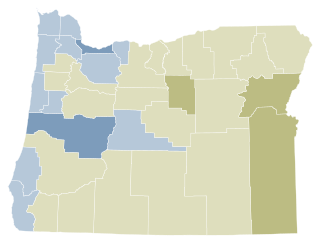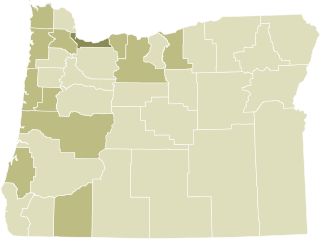Ballot Measure 47 was an initiative in the U.S. state of Oregon that passed in 1996, affecting the assessment of property taxes and instituting a double majority provision for tax legislation. Measure 50 was a revised version of the law, which also passed, after being referred to the voters by the 1997 state legislature.
The Oregon tax revolt is a political movement in Oregon which advocates for lower taxes. This movement is part of a larger anti-tax movement in the western United States which began with the enactment of Proposition 13 in California. The tax revolt, carried out in large part by a series of citizens' initiatives and referendums, has reshaped the debate about taxes and public services in Oregon.

The U.S. state of Oregon established vote-by-mail as the standard mechanism for voting with Ballot Measure 60, a citizen's initiative, in 1998. The measure made Oregon the first state in the United States to conduct its elections exclusively by mail. The measure passed on November 3, 1998, by a margin of 69.4% to 30.6%. Political scientists say Oregon's vote by mail system contributes to its highest-in-the-nation rate of voter turnout, at 61.5% of eligible voters.

Bill Sizemore is an American political activist and writer in Redmond, Oregon, United States. Sizemore has never held elected office, but has nonetheless been a major political figure in Oregon since the 1990s. He is considered one of the main proponents of the Oregon tax revolt, a movement that seeks to reduce taxes in the state. Oregon Taxpayers United, a political action committee he founded in 1993, has advanced numerous ballot initiatives limiting taxation, and has opposed spending initiatives. Sizemore made an unsuccessful run for Governor of Oregon in 1998. He also announced his intention to run for governor in 2010, but was indicted by the state on charges of tax evasion. The charges were later amended to failure to file tax returns.

The Oregon Medical Marijuana Act, a law in the U.S. state of Oregon, was established by Oregon Ballot Measure 67 in 1998, passing with 54.6% support. It modified state law to allow the cultivation, possession, and use of marijuana by doctor recommendation for patients with certain medical conditions. The Act does not affect federal law, which still prohibits the cultivation and possession of marijuana.

Oregon Ballot Measure 37 was a controversial land-use ballot initiative that passed in the U.S. state of Oregon in 2004 and is now codified as Oregon Revised Statutes (ORS) 195.305. Measure 37 has figured prominently in debates about the rights of property owners versus the public's right to enforce environmental and other land use regulations. Voters passed Measure 49 in 2007, substantially reducing the impact of Measure 37.

Ballot Initiative 933 was a ballot initiative in the U.S. state of Washington in 2006. It concerned land use planning, and was voted down by 59% in the 2006 elections.
Term limits legislation – term limits for state and federal office-holders – has been a recurring political issue in the U.S. state of Oregon since 1992. In that year's general election, Oregon voters approved Ballot Measure 3, an initiative that enacted term limits for representatives in both houses of the United States Congress and the Oregon Legislative Assembly, and statewide officeholders. It has been described as the strictest term limits law in the country.
Ballot Measure 7, an Oregon, United States ballot initiative that passed with over 53% approval in 2000, amended the Oregon Constitution, requiring the government to reimburse land owners when regulations reduced the value of their property.

Elections in Oregon are all held using a Vote by Mail (VBM) system. This means that all registered voters receive their ballots via postal delivery and can vote from their homes. A state Voters’ Pamphlet is mailed to every household in Oregon about three weeks before each statewide election. It includes information about each measure and candidate in the upcoming election.

On November 4, 2008, the U.S. state of Oregon held statewide general elections for three statewide offices, both houses of the Oregon Legislative Assembly, and twelve state ballot measures. The primary elections were held on May 20, 2008. Both elections also included national races for President of the US, US Senator, and US House Representatives. Numerous local jurisdictions — cities, counties, and regional government entities — held elections for various local offices and ballot measures on these days as well.

Oregon Ballot Measure 64 was an initiated state statute ballot measure on the November 4, 2008 general election ballot in Oregon.

Oregon Ballot Measure 58 was an initiated state statute ballot measure sponsored by Bill Sizemore that appeared on the November 4, 2008 general election ballot in Oregon. It was rejected by voters.

Oregon Ballot Measure 59 was an initiated state statute ballot measure sponsored by Bill Sizemore that appeared on the November 4, 2008 general election ballot in Oregon, United States. If it had passed, Oregon would have join Alabama, Iowa, and Louisiana as the only states to allow federal income taxes to be fully deducted on state income tax returns.

Oregon Ballot Measure 60 was an initiated state statute ballot measure filed by Bill Sizemore and R. Russell Walker. Sizemore referred to it the "Kids First Act." The measure appeared on the November 4, 2008 general election ballot in Oregon.
Loren Ernest Parks was an American businessman from the state of Nevada. He previously lived in Oregon, from 1957 to 2002, and was the biggest political contributor in the history of that state. He financed numerous ballot measure initiative petitions and campaigns from the mid-1990s. He also contributed heavily to races for prominent offices by his attorney, Kevin Mannix, a frequent chief petitioner of ballot campaigns.

Oregon Ballot Measure 61 was an initiated state statute ballot measure that enacted law to create mandatory minimum prison sentences for certain theft, identity theft, forgery, drug, and burglary crimes.

Oregon Ballot Measure 62 (2008) appeared on the November 4, 2008 general election ballot in Oregon. It was an initiated constitutional amendment dealing with the issue of where a percentage of profit from the Oregon State Lottery should go. The initiative, if it had passed, would have required that 15% of net lottery proceeds be deposited in a public safety fund. 50% of that fund would have been distributed to counties to fund grants for childhood programs, district attorney operations, and sheriff's investigations. The other 50% of the fund would have gone to Oregon State Police criminal investigations and forensic operations. It is expected that most of that money would have been diverted from schools. It was rejected with around 60% of the votes statewide; every county except for Josephine saw majority rejection.

Oregon Ballot Measure 97 was a ballot measure in the 2016 election in the U.S. state of Oregon. The initiative asked voters to determine whether or not to impose a 2.5 percent gross receipts tax on C corporations with Oregon sales exceeding $25 million. S corporations and benefit companies would be exempt from the tax. It was estimated the measure would raise $3 billion annually for the state, if passed.













